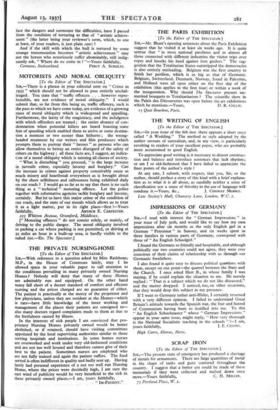MOTORISTS AND MORAL OBLIQUITY
[To the Editor of THE SPECTATOR.]
SIR,—There is a phrase in your editorial note on " Crime in 1935 " which should not be allowed to pass entirely unchal- lenged. You state that " traffic offences . . . however repre- hensible, are not evidence of moral obliquity." I would submit that, so far from this being so, traffic offences, such is the pass to which we have come today, are evidence of a growing mass of moral obliquity which is widespread and appalling. Furthermore, the laxity of the magistracy, and the indulgence with which offenders are treated ; the entire absence of con- demnation when potential killers are heard boasting some feat of speeding which enabled them to arrive at some destina- tion a moment or two sooner than hitherto ; the wrong- headed treatment by our writers and film producers which prompts them to portray their " heroes " as persons who can allow themselves to betray an entire disregard of the safety of others on the highway ; all these facts are, I suggest, an indica- Con of a moral obliquity which is tainting all classes of society.
" What is disturbing " you proceed, " is the large increase in juvenile crime, especially larceny and burglary." Can the increase in crimes against property conceivably cause as much misery and heartbreak everywhere as is brought about by the sheer selfishness and callousness being exhibited daily on our roads ? I would go so far as to say that there is no such thing as a " technical " motoring offence. Let the police together with reformative agencies tackle burglary and larceny, certainly. But let us have this major crime of the condition of our roads, and the state of our morals which allows us to treat it as a light matter, put in its right place—first !—Yours 225 Whitton Avenue, Greenford, Middlesex.
[" Motoring offences " do not consist solely, or mainly, of driving to the public danger. The moral obliquity involved in parking a car where parking is not permitted, or driving at 32 miles an hour in a built-up area, is hardly visible to the naked eye.—En. The Spectator.]






































 Previous page
Previous page